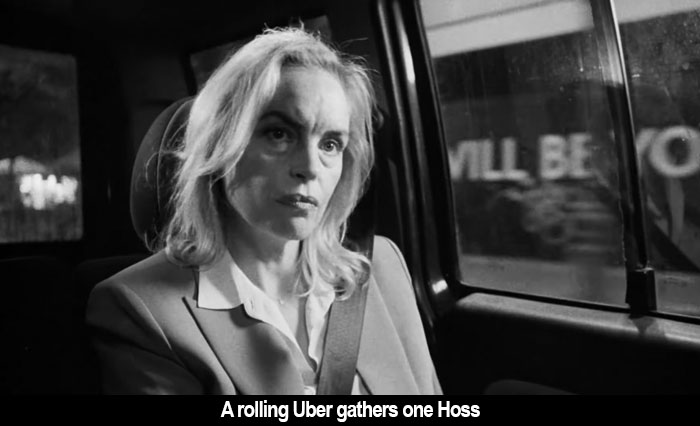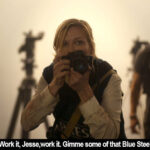Nu astepta prea mult de la sfârsitul lumii
****/****
starring Ilinca Manolache, Ovidiu Pîrșan, Nina Hoss, Dorina Lazăr
written and directed by Radu Jude
Do Not Expect Too Much from the End of the World is now playing in Vancouver, Montreal, and Winnipeg. Opens in Toronto on May 4 at TIFF Bell Lightbox and on May 29 at the Carlton Cinemas.
by Walter Chaw I know this film. I know the anger that drives it… No, it isn’t anger, it’s incredulity and exasperation, the kind I’ll hold when I’m led to my pyre for the crime of reading a book, or holding a merciful opinion, or wishing for a reasonable solution. It’s the realization that Yeats was right about the worst and the best of us: the one will summon the will to bend the world while the other will fret and demur until the noose is tight and the platform drops away. I have my wit and am able to dunk on inconsistencies with the best of them, and I will do this even as I know there is no profit from shaming the shameless–from pleasuring stunted masochists who pull strength from their collective humiliation. It is my only defense, so I deploy it. I think about all those horror movies where people empty their guns into things that are not injured by bullets. “Deplorable”? At last a term of derision that can unite them like the “n-word” they pathologically want to wield. They are immune to me. I know this. I am Cassandra. Radu Jude’s Do Not Expect Too Much from the End of the World is, like his previous Bad Luck Banging or Loony Porn, a nervous breakdown of a movie–a wildly careening meltdown of a tantrum raging against the dying of all our lights, led by a woman who has reached a place of radical callousness where surprise and horror are disguised beneath a cocksureness as thick and sensitive as scar tissue.
She’s Angela (Ilinca Manolache), a production assistant on an insurance-claims documentary who side-hustles as an Uber driver. She spends most of her days and nights in a sleep-deprived state of loud desperation. After a quick fuck in the backseat of her car that leaves her glittery slip of a dress “covered with semen,” she asks her boyfriend for a few bucks to tide her over until her bosses on the film remember to pay her again. She works really hard and it doesn’t matter, because the fear of financial collapse never abates, not for a moment. She slams energy drinks, blasts her radio so she doesn’t fall asleep, and tries to make conversation with people who could give her a break but look at her like a bug they stepped on in bare feet. Late in the film, she gives the head of marketing for a major corporation–one Doris Goethe (Nina Hoss), who is indeed related to the author–a lift from the airport, and Angela mentions how she’s asked to double-shift constantly. “Well,” says Goethe, “maybe that’s a problem that Tesla’s self-driving cars can solve.” But couldn’t that potentially rob Angela of both her sources of income? Angela tries again, asking Goethe if her company is involved in the deforestation of Romania’s woods. She says it’s not her department. Then she says if it’s happening, the government and its people are allowing it. Then, she encourages Angela to go with the flow. Selling one’s soul to the devil used to carry a greater reward than a hefty bonus check and a handsome wardrobe.
Angela is screaming into a void that’s dressed in a tailored pantsuit. To vent all of her frustrated energy–to lance the boils of acid toxicity that recur like eczema during periods of extreme distress–she performs in TikToks as a bald, uni-browed caricature of Andrew Tate she’s named Bobiță. Through this digital mask, she unloads her self-loathing, her rage against the machineries of capitalism that keep her enslaved to an unsatisfactory wage, her terror of no future for her or anyone of her generation who’s been robbed of an education, home ownership, a retirement on an Earth already on fire. The grand irony of her act, of course, is that it may not be seen as a bit because, at some point, the absurdity of the situation makes it impossible to satirize. And even if it’s recognized as elaborate comedy, it’s not funny and will change no one’s opinions or behaviours. You can mock bad drivers while you’re driving, but getting the laugh doesn’t mean they’re any less likely to kill you. At the very end, when you hope Angela will intervene in a disgusting situation and she hurries past it instead, recording another Bobiță video, the sense of emptiness and despair is almost physical. We have no real mechanisms, nothing like real will, to fight the system that will kill us. A system, mind, that isn’t broken, but rather working exactly as it was designed to work.
Throughout Do Not Expect Too Much from the End of the World, Jude cuts to a 1981 Communist-era film called Angela Moves On, in which another woman behind the wheel named Angela (Dorina Lazar) drives through a pointedly less ramshackle Romania that’s been laundered to serve as propaganda for the vicious dictator Ceaușescu. Jude slows down certain frames from it, the ones capturing extras on the periphery–a human barrier to the privation and despair the picture does not want to acknowledge. The movie our Angela is helping to make is no less mediated by fascist interests. When the man chosen to tell his tale of corporate malfeasance is planted awkwardly before a camera with his family and starts to offer his testimonial, the director and various representatives of the company whittle away at his story until he’s placing the onus of worker safety on the workers themselves. One thousand dollars is a lot of money for a day’s work, the subject is reminded, and because who couldn’t use $1000, he capitulates. This sequence comprises the last 30 minutes of this bifurcated film, and it’s as excruciating an autopsy of the state of truth and our commensurate lack of faith in objective documents as any I’ve ever seen. Jude warns us not to expect much from the end of the world in the same way someone might warn someone waking from a coma in 2024 about not expecting much from the solar eclipse that just came and went. The world as we know it has ended. We are painfully aware of this. We are bred to work in misery until we die for a handful of people who will never know our names–and we know that, too. I understand Harlan Ellison’s short story “I Have No Mouth, and I Must Scream,” about a malignant A.I. that murders everyone except for that one idiot who forgets to turn out his own light before it’s too late, in a different way now than I used to. I mean, scream all you want, right? Go nuts.





